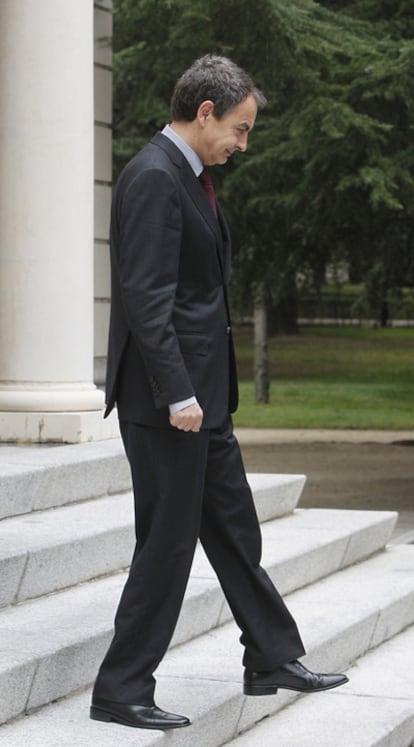Zapatero abandons public life
Former prime minister will continue with international roles but won't take part in national debates
Following two terms as prime minister, José Luis Rodríguez Zapatero is now preparing to enter a new phase of his life. He will withdraw entirely from the public eye and dedicate most of his time to being with his family and collecting himself after nearly eight years in office.
The now ex-prime minister will move this week to a new home in Somosaguas, a fashionable suburb on the outskirts of the Spanish capital. For personal reasons, Zapatero has postponed his plans to return to his native León, as he had announced.
His lifestyle will change radically: Zapatero will no longer get involved in politics.
As a former head of government, he will assume a position on the Council of State, where he will earn a salary of around 150,000 euros a year.
It will be a different direction for the 51-year-old Socialist leader, who found himself in the middle of an intense storm caused by a relentless financial crisis and soaring unemployment.
No one in his inner circle doubts that Zapatero will completely withdraw from public life, and he does not want to appear in the press. In fact, the team assigned to him does not even include a press chief. He will, however, be given a chief of staff and a personal secretary.
As opposed to Felipe González, who became a deputy in Congress after he lost the 1996 elections to José María Aznar, Zapatero will not have a seat in the chamber.
In a little more than a month, the former prime minister will also step down as his party's secretary general. On February 3, the Socialists are set to hold their convention to choose a new leader. "Say what you want, but he is going to remain completely neutral in the debate for a new secretary general," says one close aide.
Nevertheless, he is expected to continue participating in party conferences, including meetings by the Socialist federal committee.
But Zapatero doesn't want to follow in the footsteps of his predecessors, González and Aznar, who after leaving office continued participating in national debates. Zapatero has never hidden his dislike of outsiders interfering in government. "He is not going to get involved in the political debate between the government and the opposition or any issues inside his own party," said another close aide.
Besides serving on the Council of State, the former prime minister is also expected to maintain a presence on the international stage. "He will do anything in favor of Spain no matter where he is. But what he won't do is criticize the Spanish government in power," said the aide, in a veiled reference to former Prime Minister Aznar of the Popular Party (PP), who regularly attacked the Socialist administration when he traveled abroad.
Zapatero is currently the co-chairman of the UN Millennium Development Goals Advocacy Group and is expected to continue serving in this organization with Paul Kagame, the president of Rwanda, the other co-chair.
Zapatero's final official act as prime minister was last Friday when he paid tribute to the late EL PAÍS columnist Javier Pradera, who died on November 20.

Tu suscripción se está usando en otro dispositivo
¿Quieres añadir otro usuario a tu suscripción?
Si continúas leyendo en este dispositivo, no se podrá leer en el otro.
FlechaTu suscripción se está usando en otro dispositivo y solo puedes acceder a EL PAÍS desde un dispositivo a la vez.
Si quieres compartir tu cuenta, cambia tu suscripción a la modalidad Premium, así podrás añadir otro usuario. Cada uno accederá con su propia cuenta de email, lo que os permitirá personalizar vuestra experiencia en EL PAÍS.
¿Tienes una suscripción de empresa? Accede aquí para contratar más cuentas.
En el caso de no saber quién está usando tu cuenta, te recomendamos cambiar tu contraseña aquí.
Si decides continuar compartiendo tu cuenta, este mensaje se mostrará en tu dispositivo y en el de la otra persona que está usando tu cuenta de forma indefinida, afectando a tu experiencia de lectura. Puedes consultar aquí los términos y condiciones de la suscripción digital.








































